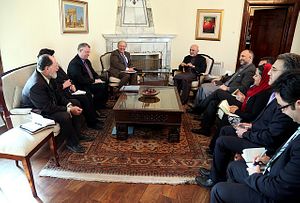On January 20, a new president will be sworn into office in the United States. For all the noise surrounding the campaign and pre-presidency of Donald Trump, the president-elect has said devastatingly little about Afghanistan. That’s not new. Afghanistan has increasingly fallen to the wayside of American attention, to the detriment of American efforts in the country.
With that frame in mind, Special Inspector General for Afghanistan Reconstruction John Sopko spoke at the Center for Strategic and International Studies in Washington, D.C. Wednesday, outlining what his organization believes are key areas for concern with regard to U.S. reconstruction efforts in Afghanistan.
SIGAR released its first “High-Risk list” in 2014. The list identifies aspects of U.S.-funded reconstruction efforts vulnerable to waste, fraud, and abuse.
“Now that two years have passed,” Sopko said Wednesday, “we felt it was important to update the list to help inform the new Congress and Administration of the most pressing reconstruction challenges in 2017 and beyond.”
Nothing on the list is particularly surprising for those with even a passing familiarity with Afghanistan. The scope and weight of the challenge, however, becomes readily apparent when the risks are listed so concisely. The new report identifies eight areas of concern, including the capacity and capabilities of the Afghan security forces, corruption and the rule of law, sustainability, on-budget support, counternarcotics, contract management, oversight, and planning and strategy.
The real devil is in the confluence of these areas. Weak leadership and rule of law, for example, undermine the capabilities of the security forces, which have proven inadequate at securing the country. And security is at the heart of the problem that is Afghanistan.
Despite spending more than $64 billion since 2002 to support the Afghan armed services, the “reportedly 320,000 strong force… is basically playing whack-a-mole following the Taliban around Afghanistan,” Sopko said.
Citing reports from the U.S. Department of Defense regarding operations in Afghanistan, which noted that “the vast majority of the Afghan National Army has little offensive maneuverability” Sopko, in typically dry style, said, “The best spin the Afghan security forces can put on their activities is that they are able to retake strategic areas after they temporarily fall. We may be defining success as the absence of failure.”
Added to the overwhelming challenges already extant in Afghanistan is the uncertainty that comes with the new U.S. administration.
“With a new president and Cabinet assuming office, we cannot be sure what direction Afghanistan policy will go,” Sopko said.
None of the options sound appealing: “Withdraw, and the democratic government may well fall. Stay, and continue what we have been doing and we may be faced with what General [Joseph] Dunford has described as a stalemate.”
The final option — “Develop, along with our Afghan and coalition allies, a new and better strategy that builds upon our successes and avoids many of the failures” — rests entirely on how President-elect Trump decides to approach the conundrum of Afghanistan.
Sopko was emphatic that Washington has a willing partner in Kabul. He was careful not to insult the Afghan fighting spirit, noting that many brave Afghans have fought and died for their country, and he highlighted the commitment of President Ashraf Ghani and CEO Abdullah Abdullah to doing “the right thing.” They, more than the Karzai administration, have cooperated with SIGAR’s efforts to battle corruption.
Sopko referenced common complaints from Kabul that the Afghans are often the last to know about programs and policy. In recent weeks, this method of handling Afghanistan minus Afghan voices was most obvious in meetings between Russia, Pakistan, and China.
“Let’s bring them in early,” Sopko said. “That would be a novel approach!”
In response to a question from The Diplomat about the incoming administration, Sopko said he was “always optimistic” and working on the assumption the new government would “focus on the issues.” Sopko also reminded that SIGAR, by statute, will remain operating until the amount of “authorized, appropriated, but not yet spent reconstruction funds fall below $250 million.”
“Right now, we’ve got $7 or more billion dollars appropriated but not yet spent,” Spoko said.
Sopko — and Anthony Cordesman, who introduced and moderated the event — both underscored the critical importance of oversight and transparency.
Trump’s Cabinet picks are not necessarily indicative of a pending about-face on Afghanistan strategy, even if they don’t signal a particular focus on it either.
Former Lieutenant General Michael Flynn — Trump’s pick for national security advisor — previously commanded the Joint Special Operations Command (JSOC) in Iraq and Afghanistan. Emran Feroz wrote in an article for The Atlantic covering Trump’s inheriting of the “good war” in Afghanistan that “Flynn and his JSOC team became infamous for executing brutal night raids to hunt militants…[the night raids are] considered a major source of anti-American feelings.”
Trump’s pick for defense secretary, retired Marine General James Mattis, served in both Afghanistan and Iraq, where he developed a reputation for “real leadership.” Given that Trump has said far more about Iraq, Syria, and ISIS than Afghanistan, Mattis pick seems geared toward that conflagration.
Rex Tillerson, who has worked for Exxon-Mobil since 1975 and is Trump’s pick for secretary of state, can also be seen as a selection targeted at the Middle East.
Between the three, it’s difficult to predict a radically new and or innovative Afghanistan policy. SIGAR, for what it’s worth, has put together a comprehensive report which outlines the scope of the challenge in Afghanistan. One can only hope that someone in the Trump administration will read it.
































